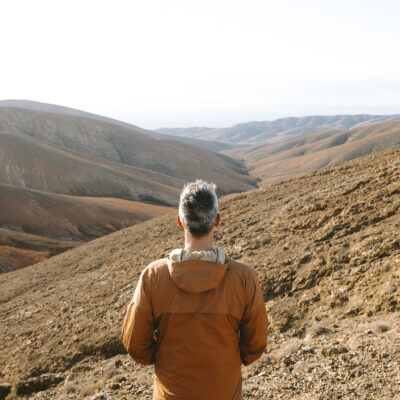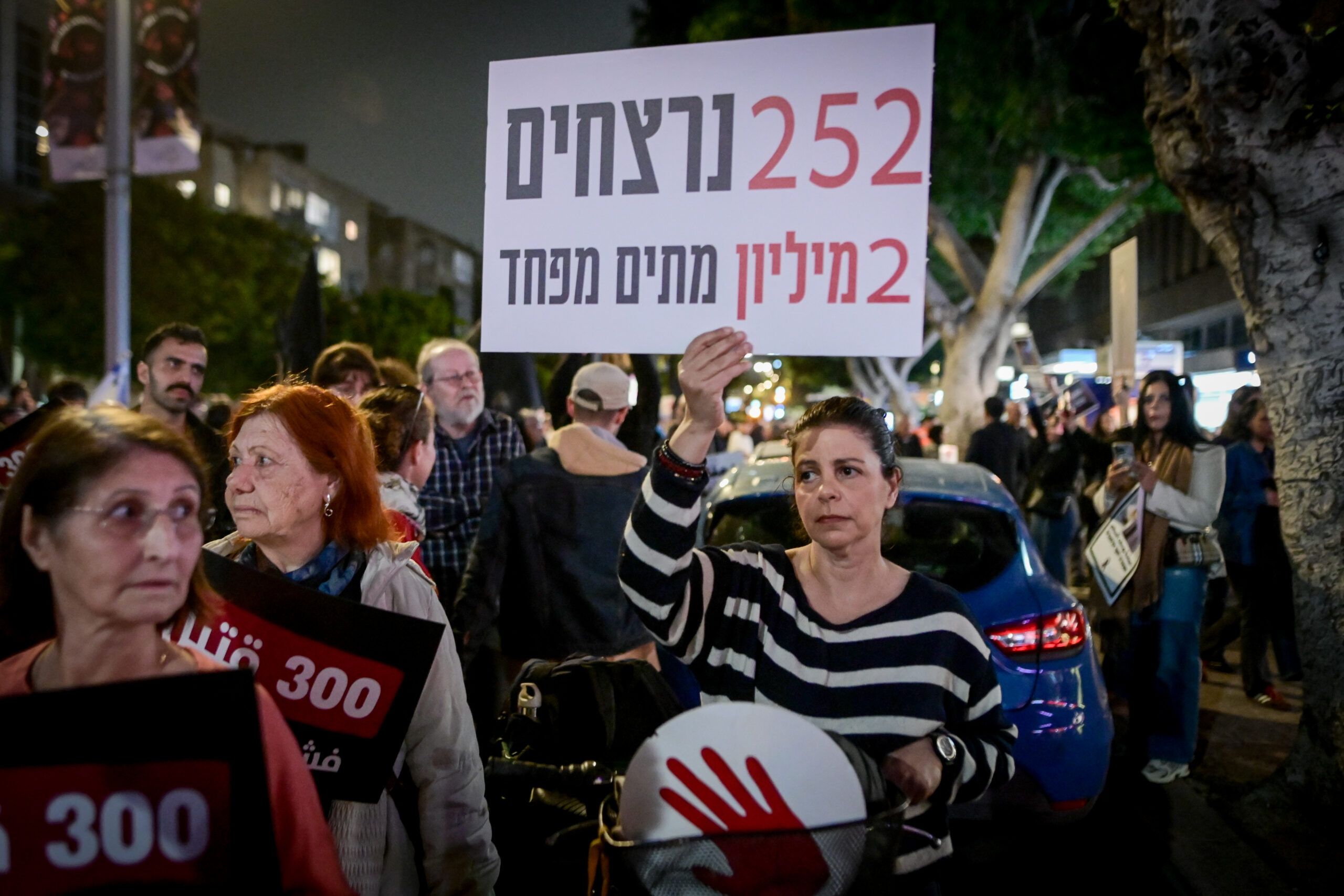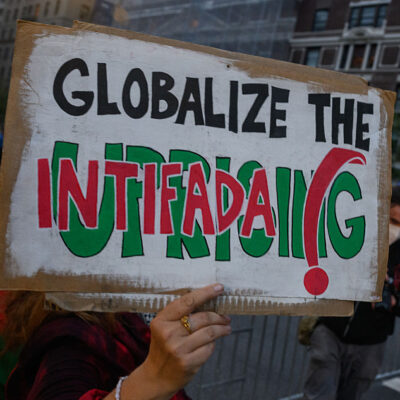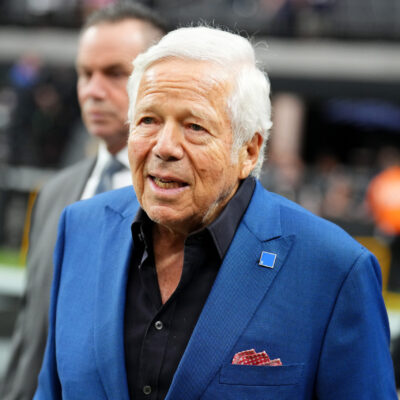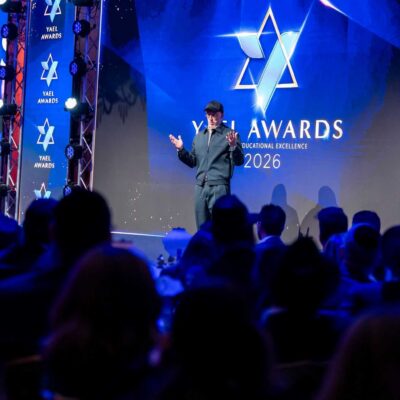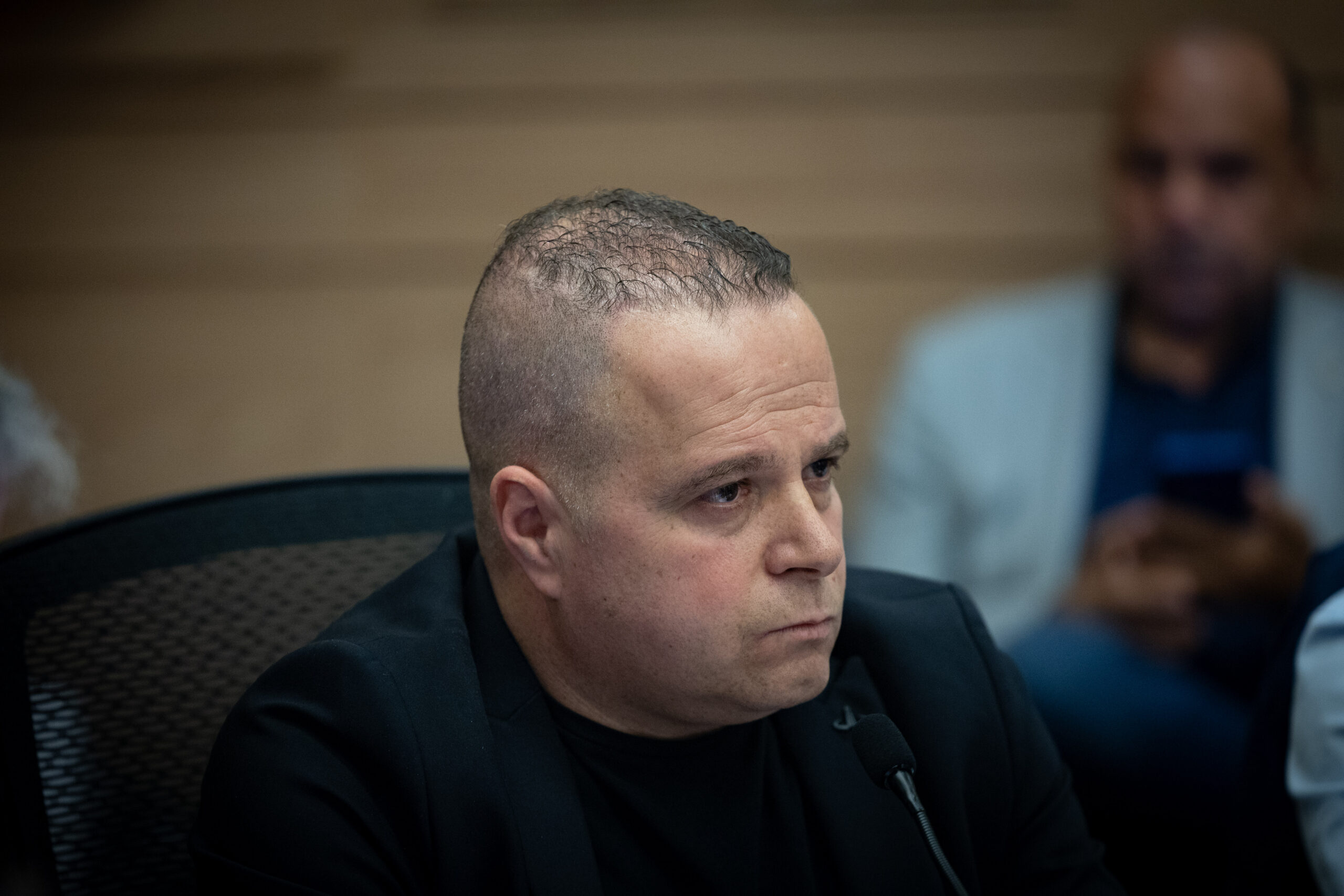Your Daily Phil: Wrapping up a grim year, with hope for a better 5785
Good Wednesday morning.
Ed. note: In observance of Rosh Hashanah, the next Your Daily Phil will arrive on Monday, Oct. 7. Chag sameach, shana tovah and Shabbat shalom. ??
In today’s edition of Your Daily Phil, we report on how Jews in the Hurricane Helene-battered Southeast are preparing for Rosh Hashanah and on the Jewish Book Council’s new initiatives to support authors facing antisemitism in the literary world. We feature an opinion piece by Shelley Rood Wernick offering steps organizers can take to protect and support the Oct. 7 survivors speaking at and attending commemorations next week; and one by Andrés Spokoiny highlighting timely messages from the Rosh Hashanah liturgy. Also in this newsletter: Rabbi Rebecca Sirbu, Leon Levine and Steve Gonzalez. We’ll start with a look back at the past year and ahead at what’s to come in 5785.
Tonight marks the end of one of the darkest years in recent Jewish memory, beginning with the deadliest attack on Jews since the Holocaust on Oct. 7, an event whose ramifications continue to be felt by Jews around the world, particularly in Israel. In Israel, fighting continues on multiple fronts, tens of thousands of Israelis remain displaced by the conflict and 101 hostages remain in Hamas captivity in the Gaza Strip, their fates unknown. Elsewhere, Jews have faced levels of antisemitism unseen in decades, which has caused many to question their physical safety, as well as their status in society, writes eJewishPhilanthropy Managing Editor Judah Ari Gross.
Even the past 24 hours have seen a massive ballistic missile barrage fired at Israel by Iran, which sent millions of Israelis into bomb shelters — and killed one Palestinian, who was struck by missile fragments — as well as a deadly terror shooting and stabbing attack in Jaffa that killed seven people and left at least eight more wounded.
As masses of Jews head to synagogues around the world for Rosh Hashanah, those institutions will be under increased security amid mounting threats against them by individuals and state actors such as Iran.
With Israel expanding its military operations to Lebanon, and Hezbollah and Iran responding with yet larger and more powerful retaliatory strikes, and with the antisemitism that was unleashed over the past year showing no serious signs of abatement, Jews bringing in 5785 do so with the hope that the worst is behind us. Indeed, some Israelis have swapped the usual “Shana tovah” — “[Have a] good year” — greeting in the days before Rosh Hashanah with a wish for a “Shana yoter tova” — “A better year.”
And yet the past year has also seen powerful expressions of Jewish unity, not seen since the Soviet Jewry movement of the Cold War.
The past year has reinforced the connection between Jews in Israel and those elsewhere around the world, both in terms of their devotion and sense of responsibility toward one another and their shared fate and interconnectedness. Many communities in Israel have palpably felt the significance of a relationship with Jewish communities abroad over the past year through Jewish philanthropic dollars, volunteer efforts and emotional support. Jews outside of Israel have also seen Israel’s vulnerability and seen that what starts in Israel often has consequences for them as well.
In response to the Oct. 7 attacks, Jewish donors — big and small — have pledged unprecedented levels of funding for Israeli and Jewish causes. Jewish organizations have launched countless new partnerships and initiatives, and entire ecosystems of new Jewish nonprofits and grassroots groups have sprung up ex nihilo around the world.
More and more Jews have become involved in their communities — in terms of personal engagement as well as with their careers — as the importance of robust and vibrant Jewish life has become more evident in what has been dubbed “The Surge.”
Maintaining these newfound Israel-Diaspora ties, keeping donors and foundations engaged and hanging onto those newly or more deeply engaged Jews will surely be the major test for the Jewish community writ large in the coming year.
Shana (yoter) tovah!
HOLIDAYS IN CRISIS
With power, water scarce and many synagogues closed, Helene-battered Jewish communities in Southeast prepare for Rosh Hashanah

Most years in Greenville, S.C., the days leading up to Rosh Hashanah consist of Jewish residents scrambling to place orders from the closest kosher caterers and grocery stores, located more than 100 miles away in either Charlotte, N.C., or Atlanta and then head to apple orchards in Hendersonville, N.C., in the Blue Ridge Mountains on a federation-run trip to pick the perfect apples for dipping in honey. None of that will happen this year. Just days before Rosh Hashanah, Greenville was among the hard-hit areas after Hurricane Helene made landfall, causing washed-out roads, fallen trees, downed power lines and widespread cellular service outages in large parts of the Southeast including North and South Carolina, as well as Florida, Georgia and Tennessee, reports eJewishPhilanthropy’s Haley Cohen.
Tough going: “Deliveries have been put on hold, which anyone keeping kosher has been impacted by,” Courtney Tessler, CEO of Greenville Jewish Federation, which encompasses 11 counties in the northwestern part of the state, home to an estimated 4,500 Jewish residents, told eJP. “Scheduled services at congregations have been canceled because they don’t have power,” she continued, noting that according to estimates, power won’t be restored until Friday. “Many community members are unable to get to family in other areas for the holiday because of issues with no power and limited communication.”
Jews helping Jews: Several Jewish communities in the Southeast that were also impacted by the storm — but minimally — have reached out to those harder hit, inviting members of nearby communities into their homes and synagogues for the High Holy Days. In Charlotte, Rabbi Asher Knight, who leads Temple Beth El, is preparing his congregation to welcome residents of Asheville and other battered cities for High Holiday services — even as multiple members of his own community have had to evacuate their homes due to fallen trees. Also in Charlotte, the local Chabad has offered assistance in the form of kosher food, bottled water, gasoline and other supplies to nearby Asheville. “We have delivered badly needed supplies to them by Sprinter van and have been collecting items they need and funds to keep them going,” Rabbi Yossi Groner, who leads Chabad of Charlotte, told eJP.
EXCLUSIVE
To fight ‘culture of fear,’ Jewish Book Council launches efforts supporting authors

Since Oct. 7, it hasn’t been easy to be an author with ties to Israel. Book awards ceremonies turned into platforms for anti-Israel activists. Protests raged through conferences. Jewish authors had appearances canceled. Prominent literary social media accounts used their platforms to call out writers they deemed “Zionist,” and there was a blacklist making the rounds titled, “Is Your Fav Author a Zionist?” “What we’re seeing is a general culture of fear that’s now being created across the entire field,” Naomi Firestone-Teeter, CEO of the Jewish Book Council, told Jay Deitcher for eJewishPhilanthropy — but it’s not new. “The quiet part is now being said out loud.”
New initiatives: In February, the council began collecting reports of antisemitism in the literary world, leading to immediate pushback in the literary sphere. Since then, over 100 incidents have been reported. Based on what’s come in, this month, JBC is launching numerous initiatives to support and uplift Jewish authors and books, including marketing grants, support groups, book clubs and a legal rights workshop for writers. The council also will continue publishing its Witnessing series, which features works by Jewish authors grappling with a post-Oct. 7 world.
BEST PRACTICES
How to host empowering and safe commemorations with Oct. 7 survivors

“In less than a week, over 100 communities across North America will gather to commemorate one year since the atrocities of Oct. 7. Many of them are asking survivors of the terrorist attacks to share their experiences, an ask that is both critically important for the community and extremely fraught,” writes Shelley Rood Wernick, managing director of the Jewish Federations of North America’s Center on Aging, Trauma, and Holocaust Survivor Care, in an opinion piece for eJewishPhilanthropy.
A trauma-informed approach: “I often say Holocaust survivors are our teachers and our heroes. They have taught us the dangers of bigotry and indifference, the power of resilience and how to provide social services to older people with a history of trauma. We at the Center have learned how to have conversations about their history by using a person-centered, trauma-informed (PCTI) approach; and after seeing Holocaust survivors’ distress following interviews with well-meaning reporters, JFNA developed ‘Best Practices for Publicly Engaging Survivors of Trauma’ and expanded it to cover public events as well as interviews. Organizers of the upcoming commemorations should take note, particularly those that will have survivors in attendance… Event planners may want to evoke emotion in their audiences, but there is a difference between touching our hearts and retraumatizing people who are already hurting.”
ALL ABOUT RELATIONSHIPS
Maradona, quantum physics and Rosh Hashanah

“Rosh Hashanah tells us to look into our hearts and plan our own life journey, but it reminds us that the journey is not and cannot be a lonely one,” write Andrés Spokoiny, president and CEO of the Jewish Funders Network, in an opinion piece for eJewishPhilanthropy.
Reading between the lines: “Rosh Hashanah celebrates a symbolic anniversary of the creation of the world, so it would be appropriate to read the first chapters of Genesis, the story of the Creation… Instead, we read from the Torah about the relational problems of the patriarchs: the rivalry between Sarah and Hagar; the conflicts between Isaac and Ishmael; the heartbreak of Abraham in facing those conflicts; and finally Abraham’s heart-wrenching commitment to offer his son in sacrifice, only to have him saved in extremis.” In short, we don’t read about the philosophical and metaphysical questions of Creation, but about relationships: between husbands and wives, parents and children, Man and God. We are not talking about the world but about how entities within it related to one another — because that is, ultimately, what makes up the fabric of life.”
A particular narrative: “Because the High Holy Days are times of personal introspection, there’s the risk of thinking that we alone, divorced from the community, are the locus of existence. Maybe that’s why even prayers that are deeply personal, like the Viduy (confession of sins), are said in the plural: to remind us that even when we examine our own hearts, we are part of a web of relationships. But there are many biblical texts about relationships, so why these ones? Why ones that relate to our first patriarch? I think that choosing the intersection of family and peoplehood is not casual.”
Worthy Reads
Jewish Funding in Wartime: In Inside Philanthropy, Wendy Paris interviews Rabbi Rebecca Sirbu, the executive vice president of the Jewish Funders Network, about the organization’s work since Oct. 7. “Have you seen division in your group of funders? No, thankfully we have not. We held our annual conference in March in Tel Aviv. We were concerned that we would have a much smaller conference than normal. In fact, we had the opposite. We completely sold out and had 100 people on the waiting list… I have to tell you, the conference itself was so emotional, just being there. We cried. This is not a conference where people cry. How has the attack by Hamas and ongoing war affected membership in your group? There has been a very large increase in the Jewish philanthropic community since the attack on October 7. We just did a member survey asking how people changed their giving since the attack and the ongoing war, and 86% reported an increase in their giving. This was not an official survey looking at 990s; it was anecdotal, based on self-reports. From our internal, nonscientific asking, over 50% of foundations have increased their giving this year by more than $250,000 since October 7, and over 25% of individuals have increased their giving by between $50,000 and $250,000.” [InsidePhilanthropy]
Step Zero: In a blog post for Candid, David M. Holmes offers advice for people contemplating starting a new nonprofit. “Before you take that first step, consider everything that goes into starting a nonprofit — not just the legal steps but also the logistical steps of creating a business plan, securing enough funding to get going (and keep going), and deciding how the work will get done without a miracle windfall. Candid offers several free resources that can help you think through the steps, including our Nonprofit Startup Assessment Tool and our free class ‘Is Starting a Nonprofit Right for You?’ We also recommend that you talk to experts. For example, SCORE provides free mentoring services for any kind of business creation. You may also want to check with your local bar association to see if they can connect you with a lawyer with expertise in helping nonprofits — and who may be able to offer their services pro bono. And you might ask yourself again: Is there any other way to channel your passion and sense of urgency into an existing nonprofit? Knowing who’s already working in your city and how you can complement or assist them is essential.” [Candid]
The Office Beckons: In a recent episode of Harvard Business Review’s podcast, IdeaCast, guest Michael Morris, an author and Columbia Business School professor, delves into the role of a shared physical workspace in organizational culture. “[O]ne important tool for managers and that savvy managers have always used is understanding how the workplace or the different parts of the workplace contain certain cultural cues that bring certain identities and certain habits sets and certain ideals and certain traditions to the fore, knowing that you can be an architect of those situations in order to dial up or dial down particular cultural identities. Within any organization, you may have the organizational culture as a whole, and that is triggered by the office. It’s why companies today are doing return to office because they realize that during work from home, individual productivity may have gone up, but coordination went down because coordination happens through peer codes, which are triggered by the office.” [HarvardBusinessReview]
Word on the Street
The Global Jewry collective is organizing a moment of silence on Oct. 7 to commemorate the one-year anniversary of the deadly terror attacks, which will be held at 12:10 p.m. EST to coincide with a memorial ceremony being held at the same time in Tel Aviv’s HaYarkon Park…
The Charlotte, N.C.-based Leon Levine Foundation has committed $5 million in funding to support relief efforts in Western North Carolina, with an initial $1 million grant distributed to the Community Foundation of Western North Carolina to support its Emergency and Disaster Response Fund…
The Anti-Defamation League has hired Steve Gonzalez as its next vice president of global safety and security; Gonzalez previously served for some 25 years in government service, in the U.S. Navy and FBI, most recently as assistant special agent in charge of the bureau’s New York Criminal Division…
A weeklong version of The Nova Music Festival Exhibition, arranged by Pennsylvania Gov. Josh Shapiro, will open on Sunday at the Weitzman National Museum of American Jewish History in Philadelphia marking the anniversary of the Oct. 7 Hamas attacks in Israel…
The Simons Foundation and the National Science Foundation have donated $20 million grants to Northwestern University in Evanston, Ill., and the University of Texas at Austin for an institute for astrophysics research and an institute focusing on astronomical research…
The election victory of the Austrian far-right Freedom Party, which has Nazi roots, has raised serious concerns among the Austrian Jewish community…
In The Times of Israel, Gary Rosenblatt interviews now-adult victims of Baruch Lanner, a former NCSY leader who sexually, physically and verbally abused teens in his care for decades, following a settlement between a group of them and the Orthodox Union this summer; also in The Times of Israel, one of the women who sued the OU over Lanner’s abuse outlines the steps toward traditional teshuvah that she and others believe the organization should now take…
As a part of an essay series in The Forward a high school student from Memphis, Tenn., reflects on how Oct. 7 changed his observance of Judaism and how the on-campus pro-Palestinian protests last year have impacted his decision of where he’ll be applying to college…
The Department of Homeland Security announced that it will open applications in late October for a supplemental round of $210 million in Nonprofit Security Grant Program funding in late October. The funding is left over from the national security supplemental bill passed in April…
A representative from Yale University’s board of trustees, known as the Yale Corporation, met with student activists pushing for the school to divest from weapons manufacturers…
The Jewish Federation of Greater Harrisburg, Pa., held an open house to introduce the community to its new home at the city’s Dixon University Center; the federation purchased the building in 2021…
Pic of the Day

A home care worker from the American Jewish Joint Distribution Committee helps Lviv, Ukraine, resident Tamara Risova, 82, have apples and honey ahead of tonight’s Rosh Hashanah holiday.
Risova is among the 23,000 people in Ukraine receiving assistance from JDC, whose efforts are financially supported by the Jewish Federations of North America, the Claims Conference and the International Fellowship of Christians and Jews.
“JDC will also hold hundreds of Rosh Hashanah events in Ukraine, across the former Soviet Union, and around the globe, including in Israel, where families are volunteering to deliver honey cakes, honey, and Rosh Hashanah cards to elderly residents in the frontline city of Ashkelon… in Hungary, where the Holocaust Survivors Support Program will send out 2,000 Jewish New Year cards to survivor clients; and in Cuba, where Rosh Hashanah services and dinner will be provided for approximately 200 members of the community,” the organization said.
Birthdays

Co-founder and CEO of the software firm Palantir Technologies, Alexander Caedmon Karp…
Partner in Baltimore’s Workshop Development and leading commercial real estate broker, Richard Manekin… Co-chair of external relations at the Melvin J. Berman Hebrew Academy (Rockville, Md.), Diana Ely Epstein… Professor emeritus of electrical engineering at Stanford, and an inventor of public key cryptography, Martin Edward Hellman… Bethesda, Md., resident, Samuel G. Kaplan… Fashion designer and the creator of the Donna Karan New York and DKNY clothing labels, Donna Karan… Portrait photographer whose work has been used on numerous album covers and magazines, Annie Leibovitz… Grammy Award-winning singer-songwriter and composer, focused on Jewish music, Douglas Norman Cotler… Former longtime member of the Knesset for the Shas party, Rabbi Yitzhak Cohen… Israel’s former minister of public security, Omer Bar-Lev… Former member of the Texas House of Representatives, Scott Hochberg… Israeli entrepreneur with interests in shipping, drilling, mining and soccer, Idan Ofer… County executive since 2022 of Nassau County, N.Y., Bruce Blakeman… Venture capitalist and former chairman of the Associated Jewish Community Federation of Baltimore, Bruce Sholk… National correspondent for CNN, Gary Tuchman… Former chief program officer of the Union for Reform Judaism, Mark J. Pelavin… Managing partner of the Fort Lauderdale-based Weinstein Law Firm, he is a major Democratic bundler in Florida, Andrew Weinstein… Former MLB left-handed pitcher with more MLB appearances than any other Jewish pitcher, Scott David Schoeneweis… Insurance agent at Herman E. Wealcatch Inc., Michael Gottlieb… U.S. government official at the International Trade Administration, Michelle Sara King… Head coach of women’s basketball at USC, she was an assistant coach in the NBA, Lindsay Gottlieb… Filmmaker and actor, Marek Ariel Schulman… Award-winning jazz pianist, composer and music producer, Kobi Yakob Arad… Secretary of state of Colorado, elected in 2018 and re-elected in 2022, Jena Griswold… Zionist educator at Hadassah, Diana Diner… Associate attorney at Cooley LLP, Alexander B. Fullman… Rapper and record producer, known by his stage name Quadeca, Benjamin Fernando Barajas Lasky…


 Add EJP on Google
Add EJP on Google